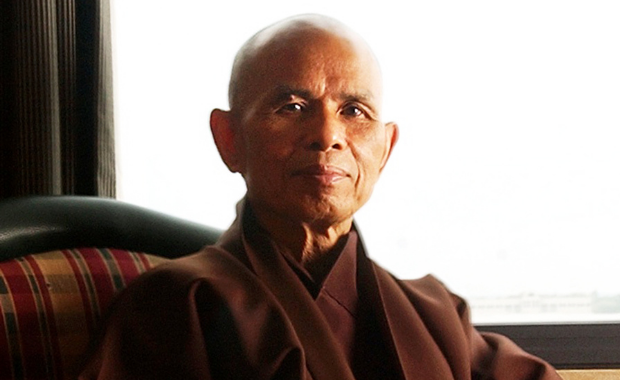Thich Nhat Hanh was one of the most influential spiritual leaders on the planet. Revered for promoting peace and bringing mindfulness to the west. Even Dr Martin Luther King, Jr. called him “an apostle of peace and nonviolence”.
It’s no wonder then that there are mourners the world over after the recent passing of Thich Nhat Hanh.
Solace does come through the powerful lessons he leaves behind.
Live in the here and now
Living presently has become a buzzword of sorts in recent years. We all know we ought to live that way, but few of us truly understand mindfulness, let alone are able to cultivate it.
Hanh’s gentle approach to mindfulness reminds us that peace is always available.
As he said, “feelings come and go like clouds in a windy sky. Conscious breathing is my anchor.”
By thinking of our feelings, and our thoughts as passing clouds, we see them differently. We no longer have to believe every thought, nor allow ourselves to fall into the trap of obsessive thinking. Instead, we gain power and perspective when we separate ourselves from our feelings and let them come and go.
Let go of suffering: start living
To really live mindfully, Thich Nhat Hanh said that we must let go of our suffering. Unfortunately, many of us would prefer to continue suffering than to step into the unknown.
And Hanh knew a thing or two about suffering. After travelling from his home country Vietnam to the U.S. and Europe to oppose war, (something that led him to be nominated for Nobel Peace Prize) Hanh was exiled from Vietnam for 39 years. Instead of making him bitter, he remained peaceful and continued his work around the globe.
“People have a hard time letting go of their suffering,” said Hanh, “Out of a fear of the unknown, they prefer suffering that is familiar.”
Our worries, anxieties, fears and regrets might feel familiar – and therefore safe – but to free ourselves and live in the present moment, we must let them go.
It means being strong with ourselves. When negative thoughts arise, we must allow them to float away. And gently come back to the present moment.
Enjoy every day
In our current world of restrictions, case numbers, and variants, naturally, fears and anxieties arise. Enjoying every day might seem hard in time’s like these. Regardless, Hanh is adamant that we ought to enjoy not just every day, but every minute too.
“I promise myself that I will enjoy every minute of the day that is given me to live,” he said.
It’s worth remembering, our days are not guaranteed. Importantly, happiness is actually a choice we make each day. There is incredible power in knowing this. Just as we can let out thoughts pass by us, we can choose to enjoy every day regardless of our circumstances.
Silence is powerful
Our world is noisy. If we aren’t obsessively scrolling on our phones, we’re replying to emails, taking calls or streaming drama shows. Notifications come in from multiple sources every hour of every day. Switching off is something that gets increasingly difficult. Yet, silence may just be the key to improving our lives.
Hanh believed so strongly in the power of silence he authored a book on it – one that had a lasting impact on my life.
“Silence is essential,” he said. “We need silence just as much as we need air, just as much as plants need light. If our minds are crowded with words and thoughts, there is no space for us.”
Practising silence allows us to hear our inner world. Rather than distracting ourselves with continuous noise, silence has the power to give us inner peace, knowledge, and knowing.
It can power our decision making, improve our focus, and perhaps even had a positive impact on our mental health. And according to Hanh, because silence comes from within, we can cultivate silence even in the most chaotic of places.
Come back to your breath
If you know anything about mindfulness, you’ll have undoubtedly heard about coming back to your breath. But for Hanh, it was so much more than a meditation technique. Connecting with our breath is a way of life and an anchor for us to truly live in the present moment.
“Breath is the bridge which connects life to consciousness, which unites your body to your thoughts. Whenever your mind becomes scattered, use your breath as the means to take hold of your mind again,” he said.
It’s uncommon for most of us to even consider our breath on a daily basis, let alone use it as a way to calm our minds. Yet focussing on our breathing for just a few minutes can do wonders for relaxation, and mental clarity.
There is comfort in passing
Having now passed, Thich Nhat Hanh’s view of death feels more relevant than ever. In one of his books, No Death, No Fear he details that when his mother passed away he suffered for a year. Then, one evening, after having an intense dream about his mother, he decided to go outside and walk in the moonlight. As he walked he realised she had never truly left him – that was a concept his mind had created.
“From that moment on, the idea that I had lost my mother no longer existed. All I had to do was… feel the breeze on my face or the earth under my feet to remember that my mother is always with me, available at any time.”
In a world that fears death, Hanh’s thoughts are comforting. Perhaps one of the greatest teachers of mindfulness and peace hasn’t left us at all.


























